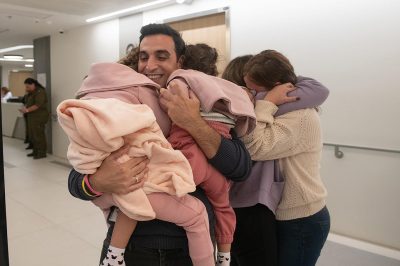×


We have detected your country as:
Please click here to go to the USA website or select another country from the dropdown list.
by: Cheryl Hauer, International Vice President
The dictionary defines a hostage as one who has been captured, taken and held as a prisoner of war, kept within bounds of confinement or held under the control of another. On October 7, 2023, over 240 people were torn from their homes, workplaces and even a music event being held to promote peace. They were dragged into the Gaza Strip, beaten, raped, terrified and humiliated. They had gone to sleep the night before, their minds occupied with thoughts of family, friends or perhaps the responsibilities of work, enjoying all the benefits of the freedom that defined their existence. But morning brought a tragic new reality that has now defined their lives for months. They are hostages.
their homes, workplaces and even a music event being held to promote peace. They were dragged into the Gaza Strip, beaten, raped, terrified and humiliated. They had gone to sleep the night before, their minds occupied with thoughts of family, friends or perhaps the responsibilities of work, enjoying all the benefits of the freedom that defined their existence. But morning brought a tragic new reality that has now defined their lives for months. They are hostages.
Those who have been released tell the story of that captivity. They speak of terror, abuses of the most horrific kind, near starvation diets and constant psychological manipulation. But unfortunately, they are unable to enjoy their newly regained freedom. Many of them are still experiencing periods of terror, unable to sleep or work. On top of that, they are living with the crippling guilt that comes because they are now “free,” while their friends and family members remain in the prison that is Gaza.
The mental health community in Israel has already begun the daunting task of helping victims deal with overwhelming trauma. And those victims go well beyond the returning hostages. They include those who survived the actual incursions, who saw their friends and loved ones slaughtered while their murderers gleefully rejoiced. Countless homes were ransacked, many burned to the ground. Survivors hid for hours in their safe rooms as they listened to Hamas terrorists eating the family breakfast in the next room. They hid in bushes, or under the lifeless bodies of friends as they pretended death to stay alive.
And it doesn’t end there. Thousands have been wounded and nearly 200,000 evacuated from southern Israel as the war rages, leaving those already victimized even further traumatized. Hundreds of thousands of reservists are in the thick of battle, leaving their families devastated. Nearly 150,000 Holocaust survivors remain in Israel, all of whom are reliving the horrors of the past, their trauma triggered by the terrifying realization that Israel is confronting what many are calling the “new Nazis.” And the families of those remaining in captivity are paralyzed with grief and fear for their loved ones.
A Traumatized Nation
The Merriam-Webster online dictionary adds one more definition to the above list, describing a hostage as one that is involuntarily controlled by an outside influence. Mental health professionals are concerned that this definition describes Israel right now: an entire nation held hostage. Psychiatrists, psychologists and counsellors are faced with providing trauma care to literally the whole country as nearly every Israeli is facing some sort of shock, fear, loss, grief or crippling uncertainty.
Many of those professionals, however, feel ill-equipped to deal with the types of traumata they are encountering. A veteran of a 20-year psychology practice in Israel recently commented that nothing in his education or training could have prepared him for the current situation. No one can predict the long-term effects this will have on the nation. Not all Israelis who are suffering extreme stress right now will develop PTSD, but the statistics say many of them will. Child victims may be facing lifetimes of introversion and social anxiety. Overall, it could mean decades of dealing with drug abuse, alcoholism, domestic violence and rage. And this kind of trauma does not just affect the actual victim. The experiences of those who survived the Holocaust proved that the horrors they suffered could have a profound and crippling effect on their children and even their grandchildren.
Millennia of God’s Faithfulness
 There is, however, light at the end of the tunnel. In a recent Media Line article, Hebrew University of Jerusalem clinical psychologist Prof. Ruth Pat-Horenczyk suggested an alternative to PTSD. She calls it PTG, or post-traumatic growth. “Although we are in the midst of a traumatic event, although we are exposed to horrible scenes, we are also exposed to heroism,” the professor was quoted as saying.
There is, however, light at the end of the tunnel. In a recent Media Line article, Hebrew University of Jerusalem clinical psychologist Prof. Ruth Pat-Horenczyk suggested an alternative to PTSD. She calls it PTG, or post-traumatic growth. “Although we are in the midst of a traumatic event, although we are exposed to horrible scenes, we are also exposed to heroism,” the professor was quoted as saying.
“People are already showing positive changes. New meaning in life, personal, strength…We are in grief. We are suffering. But we are also growing and able to do things we never thought we were able to do,” she explained.
Such growth is evidenced by the fact that there has been no mass exodus from Israel. Not only are people staying, but others are arriving from Jewish communities all over the world. And in the midst of their pain, Israelis are coming together in unprecedented unity. Thousands are volunteering to help the most profoundly affected through acts of kindness that range from cleaning out refrigerators in the hardest hit communities to welcoming displaced strangers into their homes, taking sandwiches and treats to soldiers to donating tons of clothing, toys and books to families now living in hotels.
Throughout history, the Jewish people have faced inconceivable challenges, encountering enemies who would at best oppress them and at worst destroy them. They have endured pogroms, the Spanish Inquisition and the Holocaust. Irrational hatred has nipped at their heals no matter their destination. The modern State of Israel has dealt with global anti-Semitism and has been forced into several major wars. The odds have always been against them, and yet they have not only survived, they have thrived.
Many have wondered at the source of such “Jewish resilience.” Natan Sharansky, Soviet dissident and later Israeli politician, human rights activist and author, says it stems from the proof of history. The Passover seder, he holds, imbues Jews with resilience year upon year. “Once we were slaves,” it proclaims, “but now we are free.”
“Once we were there, but now we are here.” That is the ongoing saga of the remarkable ability of the Jewish people to overcome. The God of Israel has promised His people deliverance and victory—and history has proved Him faithful. Even as they are fighting for their survival, His promises remain true. As one of the survivors of the October 7 massacre recently said, “If we give up, the evil wins. We will never let the evil win.”
Photo Credit: Click on photo to see credit
All logos and trademarks in this site are property of their respective owner. All other materials are property of Bridges for Peace. Copyright © 2024.
Website Site Design by J-Town Internet Services Ltd. - Based in Jerusalem and Serving the World.